Study 9: Decreased war intensity in 5 areas around the world through Yogic Flying
1400 volunteers trained in the TM-Sidhi programme including Yogic Flying offered to participate in a global experiment, the “World Peace Project” that took place from early October to late December 1978. The TM organisation financed the entire project from its own funds and donor funds. The Yogic Flyers traveled to different problem areas around the world where war already existed, or where the situation was dangerously explosive. They stayed in the relevant areas or, where this was not possible for reasons of security, as close to the areas as possible:
Lebanon: (civil war) 100 Yogic Flyers in Cyprus and Syria, 400 Yogic Flyers in a TM sidhi course in Israel close to the Lebanese border
Iran: (explosive situation immediately before the coming to power of Ayatollah Komeini) 206 Yogic Flyers
Thailand: (fear for spreading of war from Cambodia to Thailand): 260 Yogic Flyers
Nicaragua: (civil war, 1200 deaths in September ’78) 140 Yogic Flyers to Nicaragua, and 160 to surrounding countries Honduras, Costa Rica, Guatemala and El Salvador.
Zimbabwe (then Rhodesia, civil war, 1000 deaths in September ’78): 121 Yogic Flyers
The description of the effects of this experiment is full of miraculous events, like how there were daily bombings in Zimbabwe, but from the day the Yogic Flyers arrived the situation calmed, and in the entire country the number of deaths a day dropped by 80%, from 16 to 3, and how the government requested the Yogic Flyers to extend their stay as, whatever it was they were doing, it worked, and how the day after they finally left a bomb attack occurred and the level of violence returned to the level it was at prior to the experiment.
However, to shed these events in a more objective light, researchers worked closely with the Conflict and Peace Data Bank (COPDAB), then the world’s largest database around news events. They collected news from all over the world, national and international media (415.000 events over the previous 30 years) and would score these depending on whether it was positive or negative news, divided into 3 large groups:
1. Cooperative Events: events of cooperation, peace
2. Verbal hostilities: mild and strongly hostile remarks about the opponent
3. Hostile acts: Hostile deeds, from removal of ambassadors to war
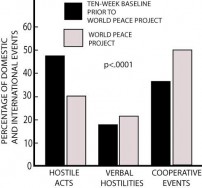 These numbers showed that, during the 10 weeks of the World Peace Project in comparison to the previous 10 weeks, the number of “hostile acts” across the 5 areas dropped by 30%, while the number of “cooperative events” increased by 30% (p<.0001). Later analysis showed that this had nothing to do with the time of year. During the previous time years no differences were noticeable in the same period.Ref.Scientific Research on Maharishi’s Transcendental Meditation, Collected Papers vol. 4 no. 322 pp. 2532-2548
These numbers showed that, during the 10 weeks of the World Peace Project in comparison to the previous 10 weeks, the number of “hostile acts” across the 5 areas dropped by 30%, while the number of “cooperative events” increased by 30% (p<.0001). Later analysis showed that this had nothing to do with the time of year. During the previous time years no differences were noticeable in the same period.Ref.Scientific Research on Maharishi’s Transcendental Meditation, Collected Papers vol. 4 no. 322 pp. 2532-2548
Study 8: Improved quality of life in the U.S. State of Rhode Island through Yogic Flying
In this experiment it was publicly predicted up front that a significant effect would be created on the general quality of life in the whole of the State of Rhode Island in the U.S., a state with 750.000 inhabitants, in the summer of 1978 and the subsequent 2 years, in comparison to previous trends in the state and in comparison to the State of Delaware, that was chosen as a control as the demographic variables are very similar.
To rule out chance and alternative explanations it was predicted up front that several variables would all improve simultaneously: Crime, death, fatal car accidents, unemployment, pollution (air quality), alcohol consumption and cigarette consumption. They obtained their data from all relevant government departments. All these different variables were brought together in one statistic called the Quality of Life index.
When the project started, 300 Transcendental Meditation teachers that had also followed the TM Sidhi and Yogic Flying training were brought to the state. They practiced Yogic Flying together in order to immediately create an effect, while also teaching as many people as possible the TM technique (for free) in order to also create a long-term effect.
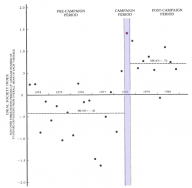 At the end of the project the scientists looked at the data, and found that a very significant improvement had occurred in the summer of 1978 as compared to the previous 5 years. In previous years the Quality of Life index fluctuated a lot, but the general trend was a continuous decrease (average -0,42). During the experimental period, the index jumped to +1,5 (p<.01) and over the subsequent two years remained at an average of +0,7. (p<.01). In the control State Delaware no improvement was reported (click on graph to enlarge it).
At the end of the project the scientists looked at the data, and found that a very significant improvement had occurred in the summer of 1978 as compared to the previous 5 years. In previous years the Quality of Life index fluctuated a lot, but the general trend was a continuous decrease (average -0,42). During the experimental period, the index jumped to +1,5 (p<.01) and over the subsequent two years remained at an average of +0,7. (p<.01). In the control State Delaware no improvement was reported (click on graph to enlarge it).
Just how significant the improvement was is demonstrated through a more thorough analysis of the individual variables, some that were predicted, but also some others that were studied later:
Suicides : dropped by 42% as compared to summer in the previous years, the biggest decrease for the 5 years researched.
Divorces: decreased by 7.7%, the biggest decrease for the 5 years studied.
Fatal car accidents: Increased by 18% annually over the previous 5 years, but decreased by 54% during the summer of ’78. The first decrease ever reported.
Murder: Continuously increased in the previous 5 years, but a decrease of 49% during the summer of ’78 in comparison to summer in the previous year.
Serious crime: Decreased by 22% compared to the previous year, the biggest decrease ever reported.
Car thefts: Lowest number of thefts ever reported for the July-August period, and biggest decrease ever reported
Beer and cigarette consumption: First decrease ever in the summer of ’78.
Total employment: reached a record level in the summer of ’78
Pollution (Carbon Monoxide and Ozone violation days): biggest decrease ever reported
Weather : The summer of 1978 was the sunniest summer in 30 years (warm weather is normally correlated to a crime increase).Ref.The Journal of Mind and Behavior 8: 67–104, 1987. Collected papers vol 4,321 pp. 2521-2531
Study 17: Decrease in crime in Puerto Rico due to Yogic Flying
In 1984 there was an opportunity for an experiment in Puerto Rico. 185 Yogic Flyers, enough to create an influence for all 3.4 million inhabitants of Puerto Rico, were trained at a local Transcendental Meditation academy, and continued to practice their TM, TM sidhi programme and Yogic Flying together from April to July 1984, although in May they only had 80% of the minimum number, and in June 60%. An analysis of crime statistics nevertheless showed a significant decrease in crime numbers for the entire country, starting in April (p<.025), and an increase again starting July (p<.025).Ref.The Journal of Mind and Behavior 8: 67–104, 1987,Scientific Research on Maharishi’s Transcendental Meditation, Collected Papers Vol. 4, no. 334, pp. 2679-2687
Study 18: Improved quality of life in Israel and reduced violence in Lebanon
Of all the studies on the Maharishi effect, this might be the most impressive one. This study was possible thanks to the generous contribution of William Ellinghaus, at the time general director of the telecom giant AT&T.
A group of scientists organised a prospective study during the summer of 1983 in Jerusalem. According to the formula, square root of 1% of the population, 65 Yogic Flyers would be required to create an influence for Jerusalem, 121 for all of Israel, and 192 for Israel and Lebanon together.
Predictions were recorded by an independent group of scientists: If the group of Yogic Flyers was big enough, the following measurable effects would occur:
In Jerusalem
1. Crime: Decrease in the total number of crimes per day. Source: Social Department Research of the Israeli police.
2. Car accidents: Decrease in the total number a day with personal injuries. Source: municipal authorities of Jerusalem
3. Fires: Decrease in the total number of incidents to which the fire services had to respond during the day. Source: municipal authorities of Jerusalem
In Israel
4. Crime: Decrease in the number of crimes per day (with the exception of Jerusalem), Source: Israeli police
5. Financial markets: Increase for Tel Aviv Stock Exchange shares
6. National mood: Better affective tone of the most prominent story (picture story on the front page) of the Jerusalem Post, according to an independent score of 1 (very negative, unpleasant) to 7 (very positive, optimistic). Scores were blind and used the average scores of two different judges independent from the project (Israeli students)
Lebanon
7. War victims: Decrease in the number of military and civil victims as a result of the Lebanon conflict, as reported in the major daily Israeli newspapers, the International Herald Tribune and the BBC World Service.
8. War intensity: Improvement in the scale of the intensity in the hostilities in Lebanon every day, as reported in news stories in the Jerusalem Post. The 5 point scale varied from 0 (no reports of fights) to 4 (full war). The rating was blind in relation to data and incidents and the analysis used the average of three independent judges that were unaware of the purpose of the experiment.
The purpose of the experiment was to create a constant group of 200 participants over a period of the two months of the experiment from 1 August to 30 September 1981, but because the group of Yogic Flyers consisted entirely of volunteers, this was practically impossible. Some could only stay for a few weeks before they returned to work or study. As a result, the number of Yogic Flyers fluctuated over the 8 weeks of the study. Here is a graph of the number of Yogic Flyers (MTUF stands for the Maharishi Technology of the Unified Field).
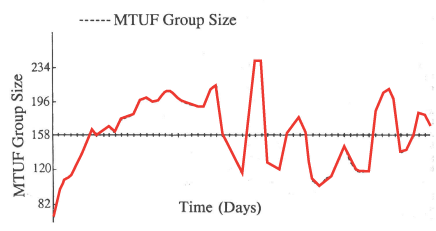
However, the fluctuations didn’t prove to be too much of a challenge for the researchers. Considering the daily data available to them on all 8 variables, they were also able to create a daily graph of how these fluctuated, and consider whether they were able to make a statistical correlation between the number of Yogic Flyers and the 8 variables under scrutiny. All eight were brought together into one index in line with acceptable statistical methods, and the index was then plotted over the 60 days of the study. When the scientists saw the study they almost fell off their chairs. No statistic was required at all to calculate the correlation, the overlap was so clear that anyone could see it with their own eyes (r = -.57 p<.0001).
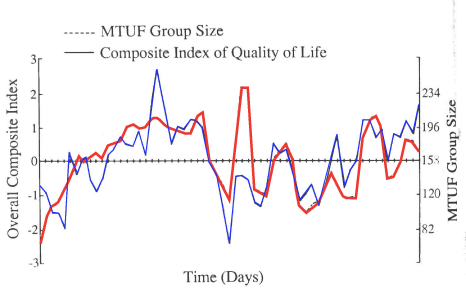
Normally, if one were to plot the fluctuations of 8 different, uncorrelated variables, the graph should look quite flat, as random fluctuations normally cancel. Not a single investor with a sound mind would base his purchase decision on the number of fires in Jerusalem. If these 8 could fluctuate so strongly (fluctuations of -3 to +3 standard deviations are very exceptional, in particular if there are 8 independent variables simultaneously) then there had to be something influencing all 8 together.
It is like someone turning the knob on a light dimmer and witnessing, full of surprise, the light increase and decrease. Instead of the light, we were witnessing the quality of the unified field at the source of everyone’s thoughts in Israel and Lebanon (see qualities unified field), that ultimately all came down to unity and positivity. That same source created more optimism among investors on the stock exchange, a stronger feeling of connectedness with fellow human beings on the war fields in Lebanon, causing a reduction in violence and fewer war victims (from an average of 24.5 deaths a day to 1.5 on days where there were enough flyers to influence Lebanon). That same source also created more optimism in newspapers, and more harmony and order in society, causing less accidents.
This study was so impressive, especially because the data all came from fully objective sources, that it resulted in one of the most prestigious publications to date, in the Journal of Conflict Resolution, vol. 32, no.4, Dec 1988, pp. 776-812. The process to get published nevertheless took 2 years, and the editor of the journal wrote the following note:
“The following article presents and tests a hypothesis that will strike most readers (myself included) as, to say the least, unorthodox…Yet the hypothesis seems logically derived from the initial premises, and its empirical testing seems competently executed. These are the standards to which manuscripts submitted for publication in this journal are normally submitted.”
Study 18: Decrease in crime and deaths in Manila, Philippines
In December 1979 a business man in Manila decided to create a group of Yogic Flyers among the employees of his company. As part of their working hours, employees could practice TM, the TM sidhi programme and Yogic Flying in the morning and evening. It was then decided to organise a new experiment, with predictions up front that crime and deaths would decrease significantly both in Manila and the Philippines as a whole. The number of Yogic Flyers taking part in the experiment was 400, which was more than what was required for Manila alone (300) but less than required for all of the Philippines (750). It was therefore decided to make an index with numbers for both.
What was interesting about this experiment was that the group was formed spontaneously in December 1979, but that, due to circumstances, several employees had to leave the location, causing the group to shrink over the following 2 years, until only about half remained at the end of the study in December 1981. When the numbers of the Index were studied, a significant decrease in the number of crimes and deaths showed in December 1979 (p<.025), followed by a gradual increase until December 1981, which seemed to quite precisely follow the number of Yogic Flyers (p<.001).Ref.The Journal of Mind and Behavior 8: 67–104, 1987,Scientific Research on Maharishi’s Transcendental Meditation, Collected Papers vol. 5, no. 401, pp. 3151-3171
Study 19: Decrease in crime in Manila, Philippines (1984)
In 1984 the government organised a large-scale project to bring Transcendental Meditation to different schools and prisons in the Philippines. 1500 Transcendental Meditation teachers (that had also followed TM sidhi and Yogic Flying training) traveled to the Philippines to take part in the project, and this was a good opportunity for a new experiment. The Yogic Flyers were spread out over the country and there was no opportunity to create one group large enough to influence all of the Philippines. However, the group was large enough to influence Manila. It was therefore predicted beforehand that crime in Manila would decrease in the experimental period of 17 August 1984 to 24 January 1985, 114 weeks in total. According to the Time Series Analysis of data of the local police, crime during those 114 weeks decreased by 12,1% percent (p<.005).
This study, along with earlier studies in Manila, New Delhi, Puerto Rico and Rhode Island, was accepted for publication in 1987 in The journal of Mind and Behaviour. Each of these 5 studies demonstrated an exceptional effect on crime, each time predicted up front, in 4 completely different areas around the world. The combined chance of such exceptional decrease in crime occurring 5 times by coincidence was smaller than one in one million (p<.000001). The editor of the journal placed the following note in the publication:
“I Decided to publish. The theory being proposed was a complete departure from the norm in either psychology or sociology, but this was a study well-done. The statistical evidence was persuasive. What I had to consider is that judging new ideas in any scientific field is an extremely delicate task. On the one hand, you never want to propound errors. On the other hand, you need to keep the field open for innovation and progress. I’m afraid that many times, new ideas don’t lose out on their merits. They lose out because established people in the field don’t want to see their power eroded by new ideas which threaten their expertise and authority. In any event, Michael Dillbeck [the author of the study] had written a strong paper with solid evidence. I didn’t see how I could deny that paper publication.”
Study 24: Higher quality of life in the U.S. (1960-1983)
In 1973 the Transcendental Meditation organisation founded its own university, which purchased a university campus in 1975 from another private education institute in the village of Fairfield in the state of Iowa in the U.S. A community of Yogic Flyers developed around the university, people from all over the U.S. moved to this small village to together practice their TM, TM sidhi programme and Yogic Flying. From early 1980 onwards the group was so large that the influence, combined with the millions of individual TM practitioners, was big enough to reach everyone in the U.S. (1520 Yogic Flyers according to the square root of the 1% formula).
In order to test this, the researchers compiled an index of the Quality of Life comprising several variables that would normally be uncorrelated, and considered whether the TM and Yogic Flying practice had a noticeable influence on the index. The following 12 social variables were incorporated into the index:
- Number of crimes
- Number of civil court cases
- Number of infectious diseases
- Number of child deaths
- Number of suicides
- Number of cigarettes per capita
- Alcohol consumption per capita
- Gross National Product per capita
- Number of patent applications
- Number of diplomas issued per capita
- Number of divorces
- Number of fatal traffic accidents
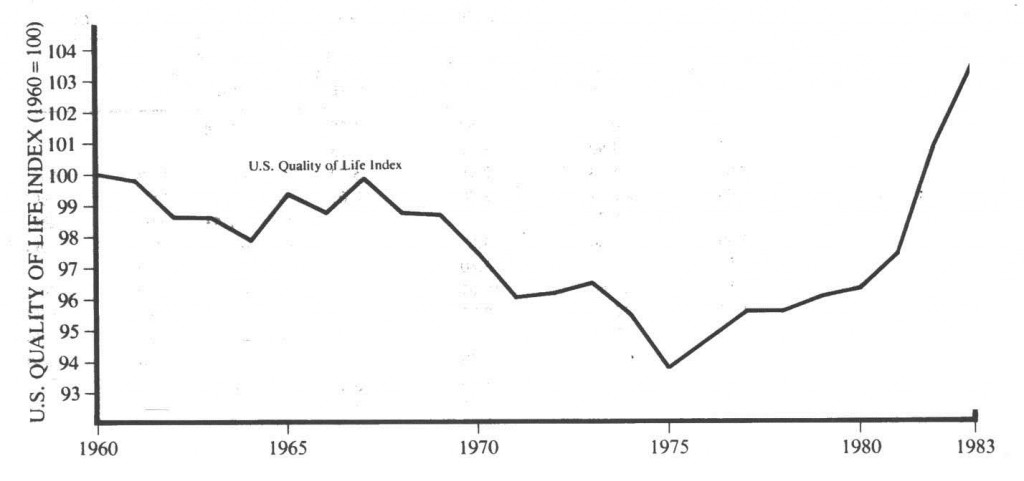
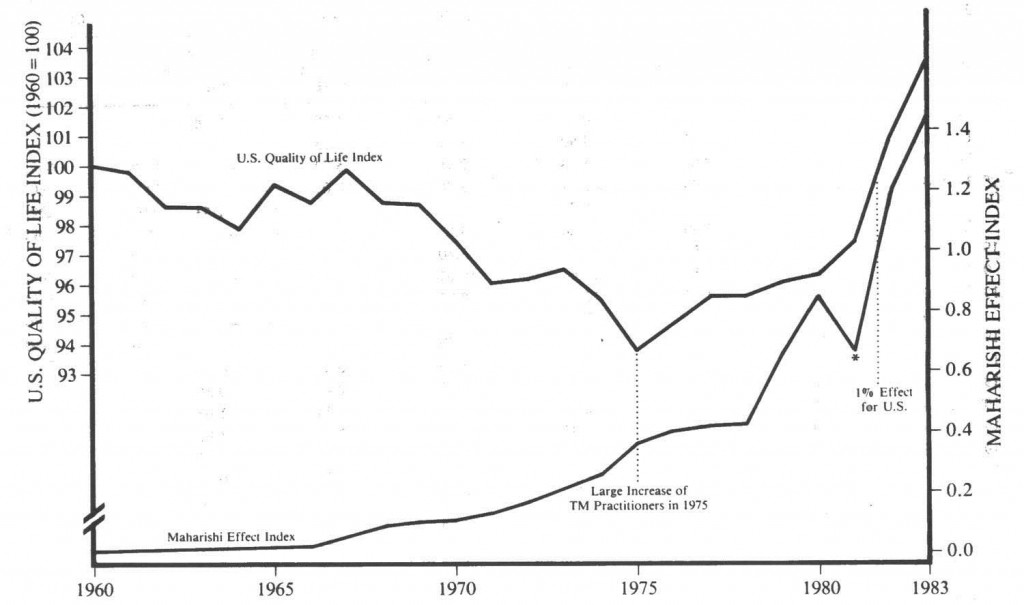
The reversal in the quality of life index appears to coincide with a large increase in the number of TM practitioners in the U.S. But the correlation between the number of Yogic Flyers in Fairfield, responsible for the strong increase in the Maharishi effect index from 1980, and the quality of life index, appeared to be much stronger (p<.0001). From a casual statistic analysis of the numbers, they were able to say with a large degree of certainty that the increase of the Maharishi-effect index was the cause of the increase in the Quality of Life index (p<.0001). According to statistical calculations, increases in the Quality of Life index from 1981 to 1983 could be ascribed to the Maharishi-effect.
When we look at the twelve variables, we get a much better idea of what this significant increase in the quality of life index means. From the 12 variables, 11 showed a significant improvement (only the number of suicides did not improve), and in 7 records were broken.
Crime: From 1981 to 1983 the number of crimes decreased in three consecutive years, something that had never happened before (-0.78% in ’81, -4.3% in ’82, and -7.6% in ’83). This meant 1.300.000 fewer crimes in 1982 and 1983, principally created by the 1600 Yogic Flyers.
Civil court cases: Due to a degree of harmony in the collective conscious, civil suits were only filed when all other amicable methods to solve conflicts have failed. The number decreased by 7.6 % in 1982 and another 11.5 % in ’83, reaching the lowest number ever reported.
Infectious diseases: Decreased by 4.23% in ’82 and by 7.02 % in ‘83 (strongest decrease in 16 years)
Cigarette usage : Decreased by 1.90 % in ’82 and 6.26 % in ’83 (biggest decrease in the 23 years of the study.)
Alcohol usage: Decreased by 3.52 % in ’82 and 2.64 % in ‘83. (second and third largest decreases in 23 years)
Number of diplomas issued: increased slightly (0.31% and 0.98%) after decrease in the previous five years
Divorces: Decreased by 4.46 % in 1982 (a decrease 3 times bigger than the previous record set 21 years earlier) and another 0.18 % in 1983 (the only time that the number of divorces decreased two years in a row)
Fatal accidents: Decreased 10.95 % in 1982 (biggest decrease ever, apart from 1975, when the 55 mph speed limit was introduced in the U.S.). The prominent magazine Motor Trend wrote at the end of 1982:
“Everyone loves a mistery, and the sudden 10% drop in 1982 highway fatalities has created a good one. Various sources postulate reasons for the decline…but the fact is, nobody knows why”
The magazine and other car organisations predicted an increase for the subsequent year, but another decrease in the number of car accidents of 4.60% was reported in 1983.
In order to provide an extra argument that the increase in the Quality of Life index from 1981 to 1983 was in fact due to the group of Yogic Flyers in Iowa, the numbers for the U.S. as a whole were compared to the numbers for Iowa. One source of light can illuminate an entire room (or an entire country), but the light will always shine brightest closest to the light source. Accordingly, a stronger improvement was predicted for Iowa than for the U.S. in general, a predicted that was confirmed by the numbers.Ref.Social Science Perspectives Journal, (2 (4), 127-146)
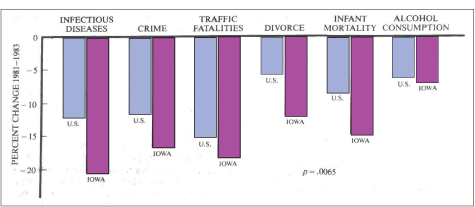
Study 33: Crime decrease in Merseyside, England
In 1988 Merseyside, a city of 1.5 million, was the most criminal metropolis in England. So when a group of Yogic Flyers in March of that year predicted on television that they were going to decrease crime significantly, not a lot of people took them serious. A few hundred Yogic Flyers had formed a small community in the town of Skelmersdale, nearby Merseyside. The intention was to live together and to practice TM, TM Sidhi and Yogic Flying together.
In March 1988 they had built a hall allowing them to do this, and the group had grown to 120 regular Yogic Flyers, theoretically large enough to create an influence for all of Merseyside. All these Yogic Flyers were normal everyday people, with their own jobs and households, but twice a day, before and after work, they would come together to create the influence, for themselves and their environment.
The graph of the number of crimes over the next 5 years looks as follows.
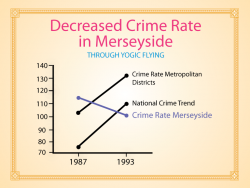 In contrast to the increasing crime trends in both the large metropolis cities in England and in general, the number of crimes in Merseyside decreased significantly (p<.00006). After 5 years Mersey had the lowest crime rate in all of England. Crime had decreased by 45% as compared to its own trends, and by 60% as compared to national trends. Merseyside was the only metropolis where crime decreased.
In contrast to the increasing crime trends in both the large metropolis cities in England and in general, the number of crimes in Merseyside decreased significantly (p<.00006). After 5 years Mersey had the lowest crime rate in all of England. Crime had decreased by 45% as compared to its own trends, and by 60% as compared to national trends. Merseyside was the only metropolis where crime decreased.
Other factors also started improving. The number of suicides decreased to the lowest overall in all of England, and other violent or accidental deaths by 1992 was the second lowest of all metropolis districts. In 1985, only 40% of all visitors went to Merseyside for pleasure, by 1990 this had increased to 80%.
The economy in Merseyside also drastically improved. Whereas the metropolis previously had only known decrease, in the early 1990s it became the model for economic advancement. In 1995 an article was published in a prominent newspaper, the Daily Mail, with the title: “Merseyside is my heaven on earth”.
Researchers calculated that the Yogic Flyers had prevented a total of 255.000 crimes. The average cost per crime was estimated at £5000 (not taking into account human suffering), which therefore implied a total saving for the government of £1.250.000.000.
For every hour that a Yogic Flyer did his thing, this implied savings for the local government of £3000. Even if the Yogic Flyers were paid a respectable salary of £30 an hour, the total cost would still be 99% lower than the current cost of tackling crime, while clearly being a lot more efficient.
This is an example of what is possible in terms of costs savings for the government, but given the exponential growth of the effect of the number of Yogic Flyers, not the best example. This was only a group of 120 Yogic Flyers. A group 10 times as big could influence 100 times more people, as some studies have shown. This means that the cost per created influence is 10 times lower.Ref.Journal of Psychology, Crime & Law (1996, vol. 2, pp. 165-174),Scientific Research on Maharishi’s Transcendental Meditation, Collected Papers vol 6, 488, pp 4079-4085
Study 35: Crime decrease in Washington DC (1994)
This study was the most public study to date. A group of scientists announced that they would, through a large group of 4000 Yogic Flyers, decrease serious crimes (murder, rape and harassment) in Washington DC by 20% during the summer of 1994. It was also predicted that the quality of life would improve, measured by a previously specified index, and that the government would start functioning more efficiently, objectively measured through an improvement in the “approval rate” of President Clinton (whose public support was at an all-time low immediately before the study, with no signs of improvement). This prediction was faxed to 1900 fax numbers, including scientists, all senators, other top politicians and 375 different media outlets. The prediction made it on to television and was reported by a good number of media outlets, including CNN, Associated Press, the Washington Post, and the Washington Times.
At that time Washington was the most violent capital city in the world. From 1986 to 1992 the crime rate increased by 77% (11% annually), despite a growing budget to fight crime (1 billion USD annually for crime in Washington DC alone). When the head of police heard this prediction, he wasn’t just a little bit skeptical. He even appeared on television, and declared:
“the only thing that will reduce crime by 20% is 20 inches (50cm) of snow, “mental harmony” alone won’t do it.”
The experiment took place in the summer, and “20 inches of snow” was therefore his way of saying: “Impossible”.
To rule out any doubt about the full objectivity of this study, a 24 member committee was put together, comprising scientists in the fields of crime and sociology, politicians, and members of the Washington Police Force. All members had one thing in common, they had no connection to the Transcendental Meditation organisation.
This committee decided through discussion what statistic information was to be used to predict crime, and to thereby see whether the crime rate during the time of the experiment deviated from the predicted crime. Their statistic model was tested against the actual numbers of the previous 5 years and appeared to very accurately predict crime. (The most important variable turned out to be crime. The higher the temperature, the more crimes).
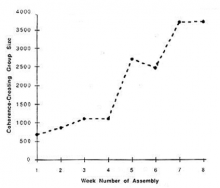 The experiment started in early June, but as with many other previous experiment the Yogic Flyers were all volunteers, having to take time off work and traveling on their own cost to Washington DC. The result was that the number of Yogic Flyers gradually increased over the 8 weeks of the experiment, until it reached 4000 in the final 2 weeks.
The experiment started in early June, but as with many other previous experiment the Yogic Flyers were all volunteers, having to take time off work and traveling on their own cost to Washington DC. The result was that the number of Yogic Flyers gradually increased over the 8 weeks of the experiment, until it reached 4000 in the final 2 weeks.
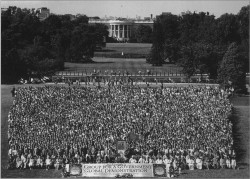
To celebrate their assembly, they decided to take a small group photo in front of the white house.
This gradual increase made the experiment that much more interesting than the researchers had originally thought. If the heavy crime rate was to follow this curve (in the opposite direction, less crimes for more Yogic Flyers), than the correlation would be much stronger.
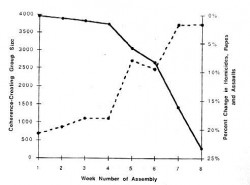 This turned out to be exactly the case. At the time of the maximum number of Yogic Flyers, the number of heavy crimes had decreased by 23%. The correlation was so strong, and the decrease so significant, that the probability of chance was 1 in 500 million (p=.000000002). Further analysis showed that if the group of Yogic Flyers could have stayed longer, crime would have dropped by 48%.
This turned out to be exactly the case. At the time of the maximum number of Yogic Flyers, the number of heavy crimes had decreased by 23%. The correlation was so strong, and the decrease so significant, that the probability of chance was 1 in 500 million (p=.000000002). Further analysis showed that if the group of Yogic Flyers could have stayed longer, crime would have dropped by 48%.
The other predictions came true too. The Quality of Life index showed a dramatic improvement, with improvement in all factors included in the index (psychiatric emergency assistance requests p=.009, media attention for Clinton p=.01, Complaints to the police p=.01, Trauma incidents p=.01, and fatal accidents p=.045).
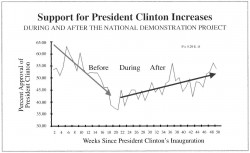 President Clinton’s approval rate also showed a dramatic, unexplainable reversal during the experiment. (p<.000000005).
President Clinton’s approval rate also showed a dramatic, unexplainable reversal during the experiment. (p<.000000005).
The Washington Post was unable to explain why both the press and the public were suddenly a lot more positive about the president. On 18 July 1994, in the middle of the experiment, they wrote:
“The Clinton Administration appears to have revived…Washington has relaxed. But such a swift reversal of political fortune is not easy to account for. [We] may logically wonder whether Clinton really turned things around or if something else is going on…almost mysteriously and almost overnight, in the face of government distress, the press seems to be transformed…Bill Clinton, after all, is still Bill Clinton…[He] hasn’t changed – and neither has the press”
This study was finally accepted for publication in one of the most prestigious scientific journals in the field of sociology, Social Indicators Research, although it took them three years to look at all aspects of the research prior to publication. The Washington DC police force co-signed the study as co-authors.
The cost to assemble 4000 Yogic Flyers for this 2 month experiment was $8 million, fully paid by the Transcendental Meditation organisation, several donors and Yogic Flyers. The normal police cost for this same period was $166 million, without succeeding to lower crime.Ref.Social Indicators Research (1999, vol. 47, no. 2)
Social effects of Yogic Flying studied.
 During the three-week period of the Taste of Utopia Assembly, compared to the three weeks before, there was a significant increase in positive events associated with the Middle East conflict in Lebanon, as principally seen in the rapid evolution of an agreement on a national security plan. In the three weeks after the Assembly the situation quickly deteriorated. Control data from the previous year showed that the specific time of year of the assembly was not associated with improved conditions in this conflict.Ref.Scientific Research on Maharishi’s Transcendental Meditation and TM-Sidhi Programme: Collected Papers (Vol. 4, 1989, pp. 2730–2762)
During the three-week period of the Taste of Utopia Assembly, compared to the three weeks before, there was a significant increase in positive events associated with the Middle East conflict in Lebanon, as principally seen in the rapid evolution of an agreement on a national security plan. In the three weeks after the Assembly the situation quickly deteriorated. Control data from the previous year showed that the specific time of year of the assembly was not associated with improved conditions in this conflict.Ref.Scientific Research on Maharishi’s Transcendental Meditation and TM-Sidhi Programme: Collected Papers (Vol. 4, 1989, pp. 2730–2762)
Social effects of Yogic Flying studied.
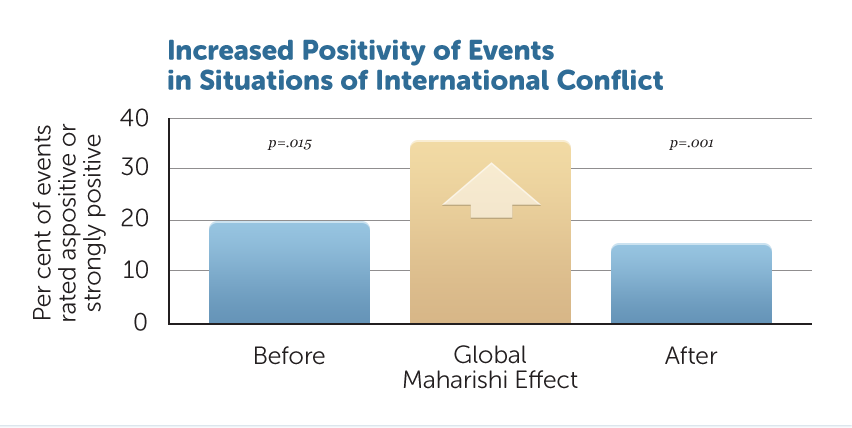 During the three-week period of the Taste of Utopia Assembly, compared to the three-week period before the Assembly, the balance of negativity to positivity in events pertaining to international conflicts in the trouble-spot areas of the world shifted significantly towards increased positivity, as indicated by content analysis of the news. In the three-week period after the assembly the balance of events reverted towards the previous condition of increased negativity. Such trends were not found during the same time the previous year.Ref.Scientific Research on Maharishi’s Transcendental Meditation and TM-Sidhi Programme: Collected Papers (Vol. 4, 1989, pp. 2730–2762)
During the three-week period of the Taste of Utopia Assembly, compared to the three-week period before the Assembly, the balance of negativity to positivity in events pertaining to international conflicts in the trouble-spot areas of the world shifted significantly towards increased positivity, as indicated by content analysis of the news. In the three-week period after the assembly the balance of events reverted towards the previous condition of increased negativity. Such trends were not found during the same time the previous year.Ref.Scientific Research on Maharishi’s Transcendental Meditation and TM-Sidhi Programme: Collected Papers (Vol. 4, 1989, pp. 2730–2762)
Social effects of Yogic Flying studied.
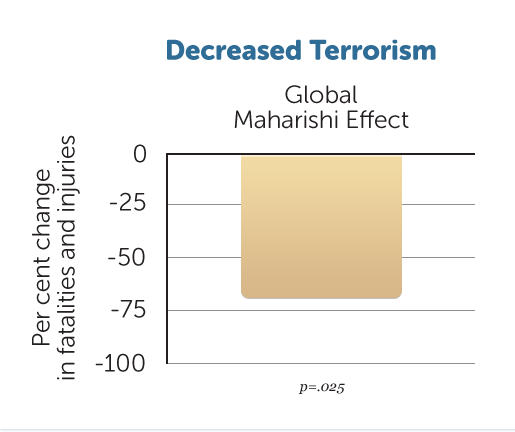 There was a significant decrease in fatalities and injuries due to international terrorism during the periods of three assemblies approaching or exceeding 7,000 experts in the TM Sidhi Programme (the square root of one per cent of the world’s population at the time), as indicated by time series analysis of an independent data bank.Ref.Journal of Offender Rehabilitation 36: 283–302, 2003
There was a significant decrease in fatalities and injuries due to international terrorism during the periods of three assemblies approaching or exceeding 7,000 experts in the TM Sidhi Programme (the square root of one per cent of the world’s population at the time), as indicated by time series analysis of an independent data bank.Ref.Journal of Offender Rehabilitation 36: 283–302, 2003
Social effects of Yogic Flying studied.
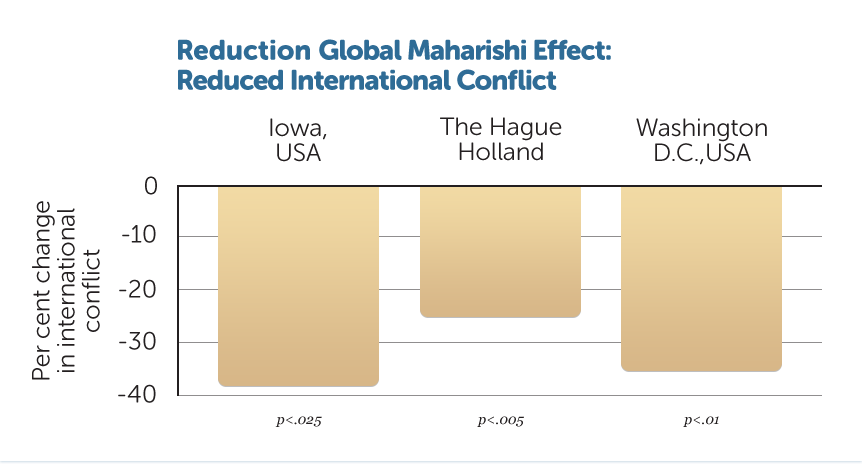 During the periods of three assemblies approaching or exceeding 7,000 experts in the TM Sidhi Programme (the square root of one per cent of the world’s population at the time), there was a significant decrease in international conflict worldwide.Ref.Journal of Offender Rehabilitation 36: 283–302, 2003
During the periods of three assemblies approaching or exceeding 7,000 experts in the TM Sidhi Programme (the square root of one per cent of the world’s population at the time), there was a significant decrease in international conflict worldwide.Ref.Journal of Offender Rehabilitation 36: 283–302, 2003
Social effects of Yogic Flying studied.
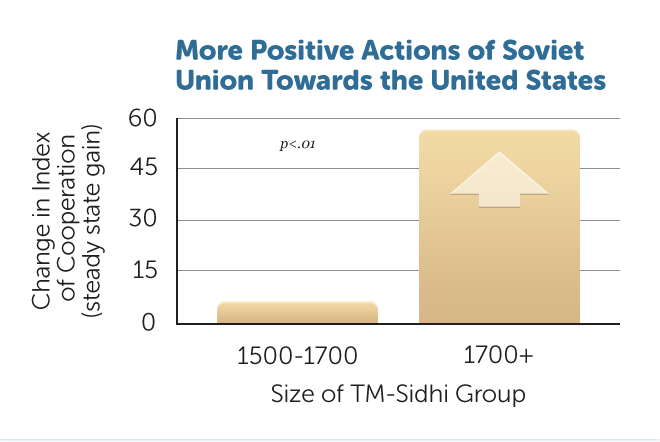 During periods from 1979 to 1986 when the size of a group of participants in the TM Sidhi Programme in the United States was larger than 1700, creating the strongest influence of the Maharishi Effect in the United States, there was a significant increase of positivity of actions of the Soviet Union towards the United States. This result, found by time series analysis of an independent data bank, was independent of the effect of US actions towards the Soviet Union.Ref.Proceedings of the American Statistical Association, Social Statistics Section, pp. 297–302. Alexandria, VA: American Statistical Association, 1990
During periods from 1979 to 1986 when the size of a group of participants in the TM Sidhi Programme in the United States was larger than 1700, creating the strongest influence of the Maharishi Effect in the United States, there was a significant increase of positivity of actions of the Soviet Union towards the United States. This result, found by time series analysis of an independent data bank, was independent of the effect of US actions towards the Soviet Union.Ref.Proceedings of the American Statistical Association, Social Statistics Section, pp. 297–302. Alexandria, VA: American Statistical Association, 1990
Social effects of Yogic Flying studied.
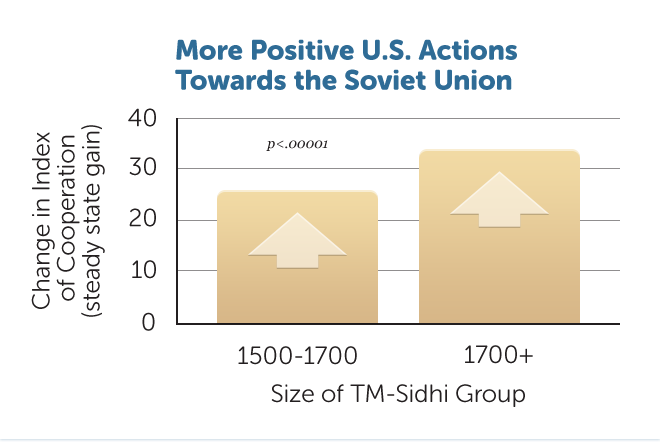 As indicated by time series analysis of an independent data bank, during periods from 1979 to 1986 when the size of a group of participants in the TM Sidhi Programme in the United States was larger than the square root of one per cent of the US population (over 1500 at the time), there was a significant increase in the positivity of actions of the United States towards the Soviet Union, compared to periods when the size of the group was smaller (below 1500).Ref.Proceedings of the American Statistical Association, Social Statistics Section, pp. 297–302. Alexandria, VA: American Statistical Association, 1990
As indicated by time series analysis of an independent data bank, during periods from 1979 to 1986 when the size of a group of participants in the TM Sidhi Programme in the United States was larger than the square root of one per cent of the US population (over 1500 at the time), there was a significant increase in the positivity of actions of the United States towards the Soviet Union, compared to periods when the size of the group was smaller (below 1500).Ref.Proceedings of the American Statistical Association, Social Statistics Section, pp. 297–302. Alexandria, VA: American Statistical Association, 1990
Social effects of Yogic Flying studied.
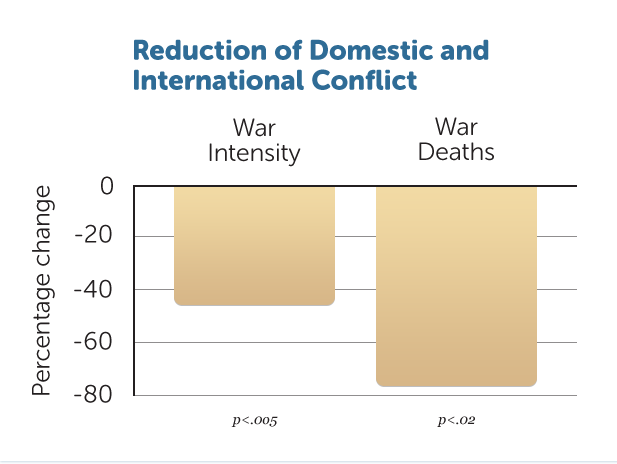 During periods when a large group was participating in the TM Sidhi Programme, there was a significant drop in war intensity and war deaths in the neighbouring Middle East conflict.Ref.Journal of Conflict Resolution 32: 776–812, 1988
During periods when a large group was participating in the TM Sidhi Programme, there was a significant drop in war intensity and war deaths in the neighbouring Middle East conflict.Ref.Journal of Conflict Resolution 32: 776–812, 1988
Social effects of Yogic Flying studied.
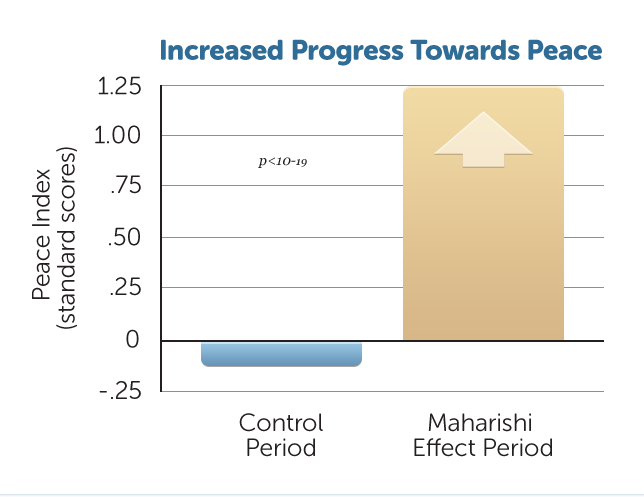 During periods in 1983–1985 when sufficiently large groups of participants in the TM Sidhi Programme were established, there was a significant increase in progress towards peace in the Middle East, as measured by an index comprising increased cooperation, reduced level of conflict, reduced war fatalities, and reduced war injuries.Ref.Journal of Social Behavior and Personality 17: 285–338, 2005
During periods in 1983–1985 when sufficiently large groups of participants in the TM Sidhi Programme were established, there was a significant increase in progress towards peace in the Middle East, as measured by an index comprising increased cooperation, reduced level of conflict, reduced war fatalities, and reduced war injuries.Ref.Journal of Social Behavior and Personality 17: 285–338, 2005
Social effects of Yogic Flying studied.
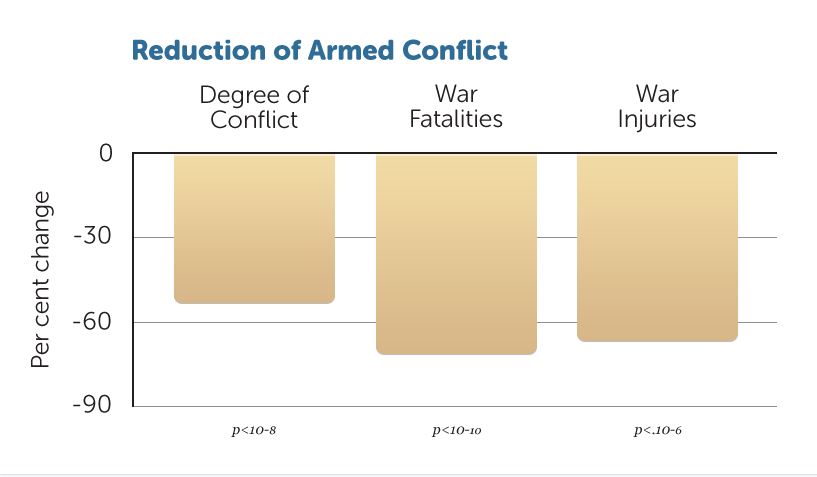 There was a significant decrease in degree of conflict, war fatalities, and war injuries in the Middle East during periods in 1983–1985 when sufficiently large groups of participants in the TM Sidhi Programme were established.Ref.Journal of Social Behavior and Personality 17: 285–338, 2005
There was a significant decrease in degree of conflict, war fatalities, and war injuries in the Middle East during periods in 1983–1985 when sufficiently large groups of participants in the TM Sidhi Programme were established.Ref.Journal of Social Behavior and Personality 17: 285–338, 2005
Social effects of Yogic Flying studied.
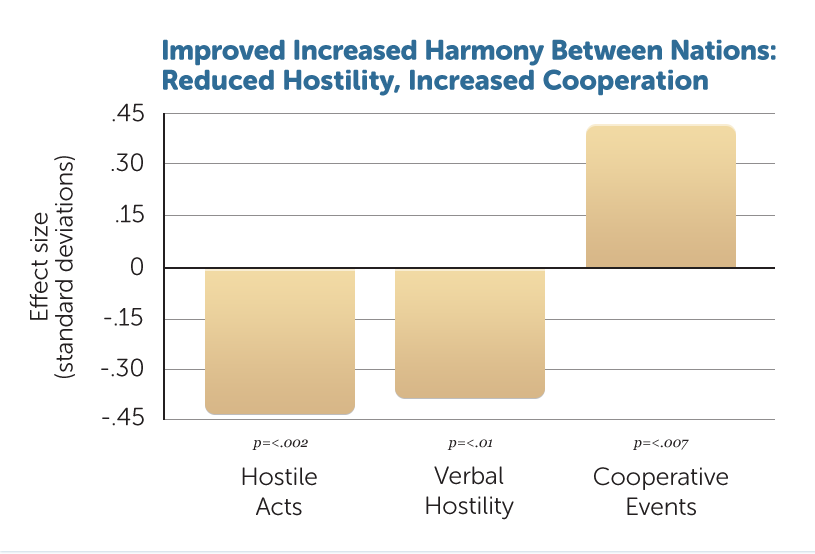 During Maharishi’s World Peace Project of October–December 1978, groups of experts in Maharishi’s TM-Sidhi Yogic Flying Programme went to the world’s regional trouble spots in Southeast Asia, the Middle East, southern Africa and Central America. Time series analysis of data from an independent data bank showed that during the peace project there was a significant worldwide decrease in international hostile acts and verbal hostility, and an increase in cooperative events; this global effect was due to the fact that the primary international conflict areas were being influenced locally by the groups of experts in the TM-Sidhi Programme.Ref.Scientific Research on Maharishi’s Transcendental Meditation and TM-Sidhi Programme: Collected Papers, Vol. 4: 2532–2548, 1989
During Maharishi’s World Peace Project of October–December 1978, groups of experts in Maharishi’s TM-Sidhi Yogic Flying Programme went to the world’s regional trouble spots in Southeast Asia, the Middle East, southern Africa and Central America. Time series analysis of data from an independent data bank showed that during the peace project there was a significant worldwide decrease in international hostile acts and verbal hostility, and an increase in cooperative events; this global effect was due to the fact that the primary international conflict areas were being influenced locally by the groups of experts in the TM-Sidhi Programme.Ref.Scientific Research on Maharishi’s Transcendental Meditation and TM-Sidhi Programme: Collected Papers, Vol. 4: 2532–2548, 1989
Social effects of Yogic Flying studied.
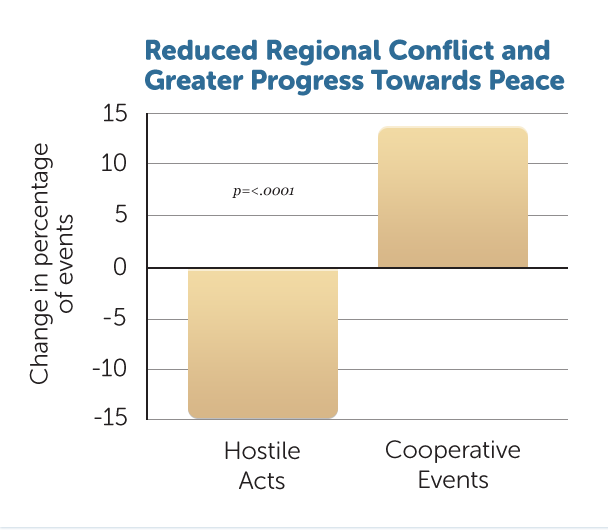 During Maharishi’s World Peace Project of October–December 1978, experts in Maharishi’s TM-Sidhi Programme went to the world’s regional trouble spots in Southeast Asia, the Middle East, southern Africa and Central America to create a calming influence through the group practice of Yogic Flying. During this time period, in comparison to a baseline period prior to the project, analysis of data from an independent data bank showed reduced hostile acts and increased cooperative events in those areas and among nations involved in these conflicts.Ref.Scientific Research on Maharishi’s Transcendental Meditation and TM-Sidhi Programme: Collected Papers, Vol. 4: 2532–2548, 1989
During Maharishi’s World Peace Project of October–December 1978, experts in Maharishi’s TM-Sidhi Programme went to the world’s regional trouble spots in Southeast Asia, the Middle East, southern Africa and Central America to create a calming influence through the group practice of Yogic Flying. During this time period, in comparison to a baseline period prior to the project, analysis of data from an independent data bank showed reduced hostile acts and increased cooperative events in those areas and among nations involved in these conflicts.Ref.Scientific Research on Maharishi’s Transcendental Meditation and TM-Sidhi Programme: Collected Papers, Vol. 4: 2532–2548, 1989
Social effects of Yogic Flying studied.
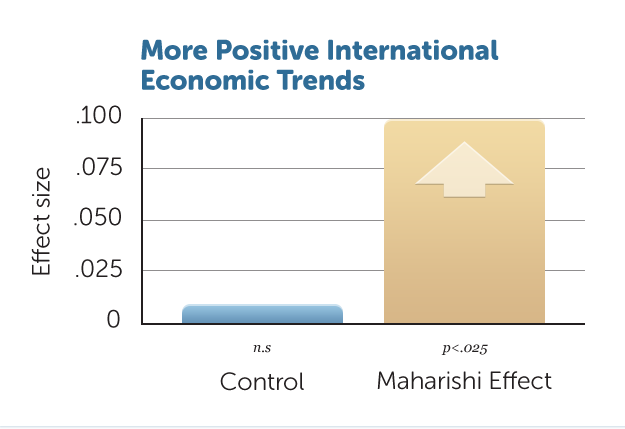 Time series analysis indicated that during three assemblies of approximately 7000 experts in the TM Sidhi Programme (the square root of one per cent of the world’s population at that time), there was a significant increase in the World Index of international stock prices, indicating improved confidence in the world economy. During control periods at the same time of year in the five years prior to these assemblies, there was no significant change in the World Index.Ref.‘Time series impact assessment analysis of reduced international conflict and terrorism: Effects of large assemblies of participants in the Transcendental Meditation and TM-Sidhi program’. Paper presented at the American Political Science Association Annual Meeting, Atlanta, Georgia, August 1989
Time series analysis indicated that during three assemblies of approximately 7000 experts in the TM Sidhi Programme (the square root of one per cent of the world’s population at that time), there was a significant increase in the World Index of international stock prices, indicating improved confidence in the world economy. During control periods at the same time of year in the five years prior to these assemblies, there was no significant change in the World Index.Ref.‘Time series impact assessment analysis of reduced international conflict and terrorism: Effects of large assemblies of participants in the Transcendental Meditation and TM-Sidhi program’. Paper presented at the American Political Science Association Annual Meeting, Atlanta, Georgia, August 1989
Social effects of Yogic Flying studied.
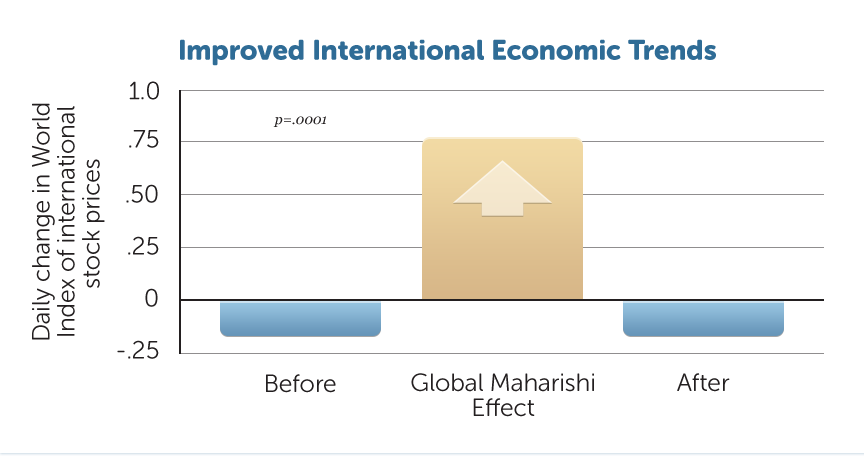 During the three-week period of an assembly participants in the TM Sidhi Programme, numbering more than the square root of one per cent of the world’s population, international economic trends improved compared to the combined periods before and after the assembly, as measured by the World Index of international stock prices.Ref.Scientific Research on Maharishi’s Transcendental Meditation and TM-Sidhi Programme: Collected Papers, Volume 4: 2730–2762, 1989
During the three-week period of an assembly participants in the TM Sidhi Programme, numbering more than the square root of one per cent of the world’s population, international economic trends improved compared to the combined periods before and after the assembly, as measured by the World Index of international stock prices.Ref.Scientific Research on Maharishi’s Transcendental Meditation and TM-Sidhi Programme: Collected Papers, Volume 4: 2730–2762, 1989
Social effects of Yogic Flying studied.
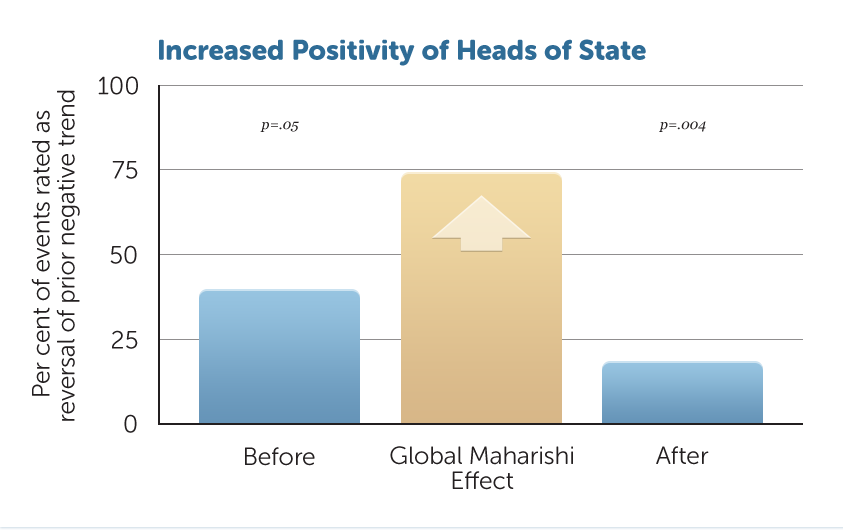 During the three-week period of an assembly of participants in the TM Sidhi Programme numbering more than the square root of one per cent of the world’s population, content analysis of news reports indicated more positive statements and actions of heads of state throughout the world and greater national and international support for their policies and leadership.Ref.Scientific Research on Maharishi’s Transcendental Meditation and TM-Sidhi Programme: Collected Papers, Volume 4: 2730–2762, 1989
During the three-week period of an assembly of participants in the TM Sidhi Programme numbering more than the square root of one per cent of the world’s population, content analysis of news reports indicated more positive statements and actions of heads of state throughout the world and greater national and international support for their policies and leadership.Ref.Scientific Research on Maharishi’s Transcendental Meditation and TM-Sidhi Programme: Collected Papers, Volume 4: 2730–2762, 1989
Social effects of Yogic Flying studied.
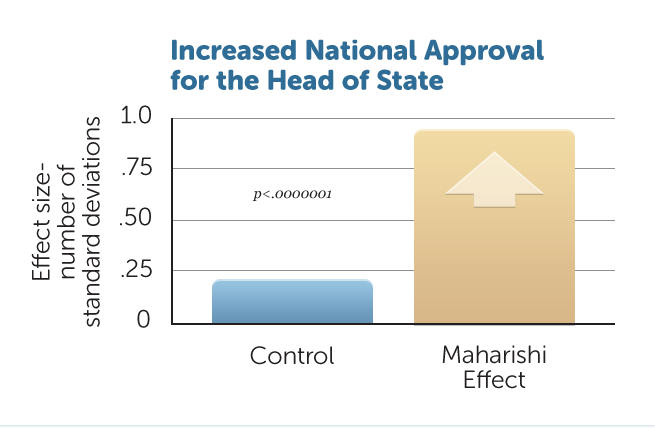 Increased approval ratings for the U.S. Head of State were found when a large group of participants in the TM Sidhi Programme was established. This effect was replicated during three presidential administrations.Ref.‘Transforming political institutions through individual and collective consciousness: The Maharishi Effect and government’. Paper presented at the annual meeting of the American Political Science Association, Washington, D.C., August 1997
Increased approval ratings for the U.S. Head of State were found when a large group of participants in the TM Sidhi Programme was established. This effect was replicated during three presidential administrations.Ref.‘Transforming political institutions through individual and collective consciousness: The Maharishi Effect and government’. Paper presented at the annual meeting of the American Political Science Association, Washington, D.C., August 1997
Social effects of Yogic Flying studied.
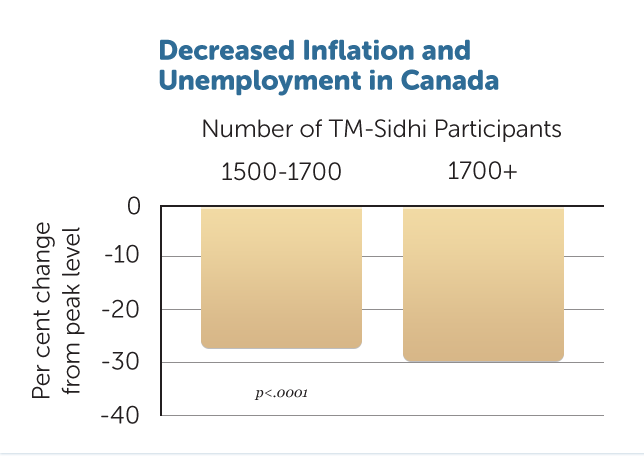 During periods when the size of a group of participants in the TM Sidhi Programme in the USA exceeded the square root of one per cent of the national populations of the USA and Canada together (between 1500 and 1700), the sum of the Canadian monthly inflation and unemployment rates declined significantly, as indicated by time series analysis.Ref.Proceedings of the Business and Economics Statistics Section of the American Statistical Association (Alexandria, Virginia: American Statistical Association): 799–804, 1987; Modern Science and Vedic Science 4: 3–41, 1990
During periods when the size of a group of participants in the TM Sidhi Programme in the USA exceeded the square root of one per cent of the national populations of the USA and Canada together (between 1500 and 1700), the sum of the Canadian monthly inflation and unemployment rates declined significantly, as indicated by time series analysis.Ref.Proceedings of the Business and Economics Statistics Section of the American Statistical Association (Alexandria, Virginia: American Statistical Association): 799–804, 1987; Modern Science and Vedic Science 4: 3–41, 1990
Social effects of Yogic Flying studied.
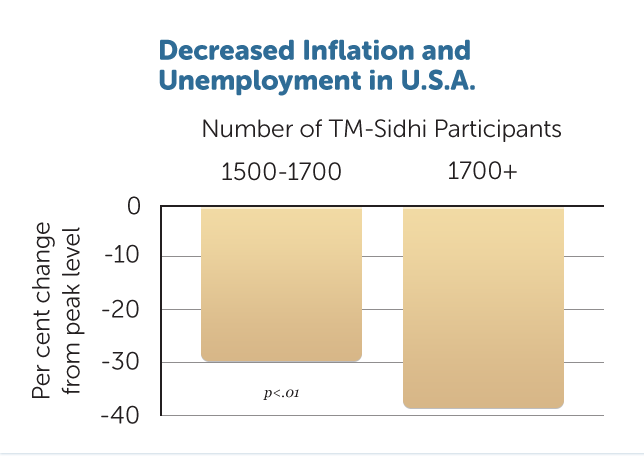 During periods when the size of a group of participants in the TM Sidhi Programme exceeded the square root of one per cent of the national population (approximately 1500), the sum of the U.S. monthly inflation and unemployment rates declined significantly, as indicated by time series analysis.Ref.Proceedings of the Business and Economics Statistics Section of the American Statistical Association (Alexandria, Virginia: American Statistical Association): 799–804, 1987; Modern Science and Vedic Science 4: 3–41, 1990
During periods when the size of a group of participants in the TM Sidhi Programme exceeded the square root of one per cent of the national population (approximately 1500), the sum of the U.S. monthly inflation and unemployment rates declined significantly, as indicated by time series analysis.Ref.Proceedings of the Business and Economics Statistics Section of the American Statistical Association (Alexandria, Virginia: American Statistical Association): 799–804, 1987; Modern Science and Vedic Science 4: 3–41, 1990
Social effects of Yogic Flying studied.
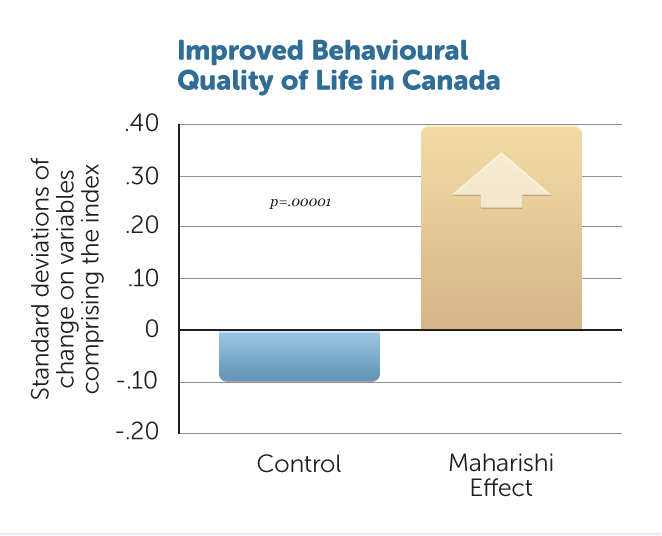 During periods when the size of a group of participants in the TM Sidhi Programme in the USA exceeded the square root of one per cent of the national populations of the USA and Canada together, there was a significant improvement in a comprehensive quality of life index comprising behavioural variables (reduction in the total of homicides, suicides, motor vehicle fatalities, and cigarette consumption), controlling for changes in national economic trends, such as unemployment.Ref.Proceedings of the Social Statistics Section of the American Statistical Association (Alexandria, Virginia: American Statistical Association): 38–43, 1996
During periods when the size of a group of participants in the TM Sidhi Programme in the USA exceeded the square root of one per cent of the national populations of the USA and Canada together, there was a significant improvement in a comprehensive quality of life index comprising behavioural variables (reduction in the total of homicides, suicides, motor vehicle fatalities, and cigarette consumption), controlling for changes in national economic trends, such as unemployment.Ref.Proceedings of the Social Statistics Section of the American Statistical Association (Alexandria, Virginia: American Statistical Association): 38–43, 1996
Social effects of Yogic Flying studied.
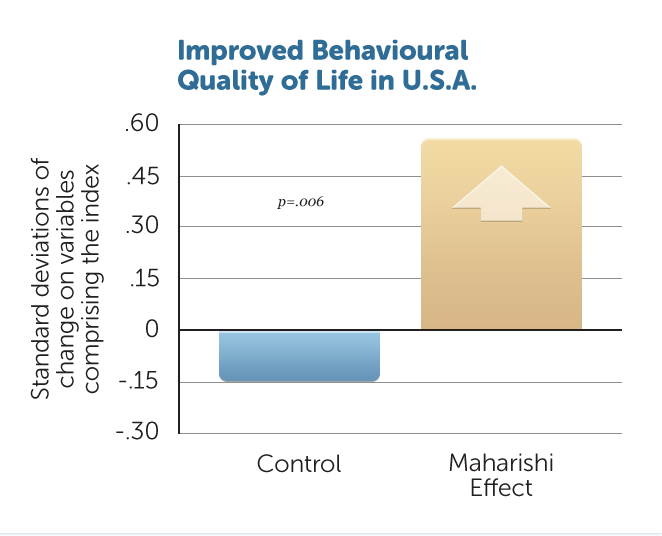 During periods when the size of a group of participants in the TM Sidhi Programme exceeded the square root of one per cent of the national population, there was a significant improvement in a comprehensive quality of life index comprising behavioural variables (reduction in the total of homicides, suicides, motor vehicle fatalities, deaths due to other accidents, notifiable diseases, alcohol consumption, and cigarette consumption), controlling for changes in national economic trends, such as unemployment.Ref.Proceedings of the Social Statistics Section of the American Statistical Association (Alexandria, Virginia: American Statistical Association): 38–43, 1996
During periods when the size of a group of participants in the TM Sidhi Programme exceeded the square root of one per cent of the national population, there was a significant improvement in a comprehensive quality of life index comprising behavioural variables (reduction in the total of homicides, suicides, motor vehicle fatalities, deaths due to other accidents, notifiable diseases, alcohol consumption, and cigarette consumption), controlling for changes in national economic trends, such as unemployment.Ref.Proceedings of the Social Statistics Section of the American Statistical Association (Alexandria, Virginia: American Statistical Association): 38–43, 1996
Social effects of Yogic Flying studied.
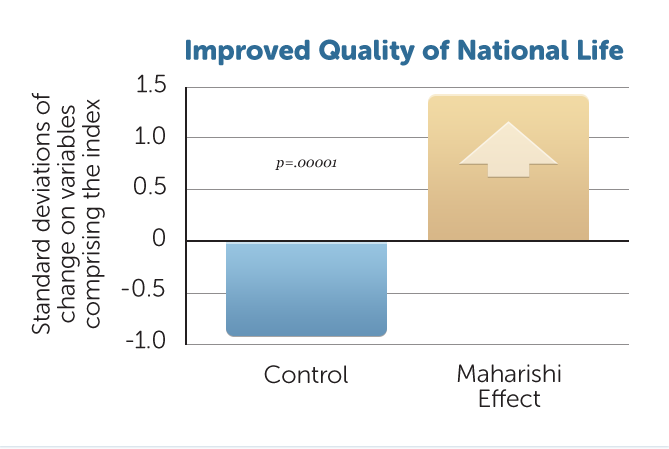 Quality of life in Israel improved significantly, as measured by an index comprising decreased crime, increased Tel Aviv Stock Exchange index, and improved national mood (analysis of daily news), when a large group was participating in the TM Sidhi Programme in Jerusalem.Ref.Journal of Conflict Resolution 32: 776–812, 1988
Quality of life in Israel improved significantly, as measured by an index comprising decreased crime, increased Tel Aviv Stock Exchange index, and improved national mood (analysis of daily news), when a large group was participating in the TM Sidhi Programme in Jerusalem.Ref.Journal of Conflict Resolution 32: 776–812, 1988
Social effects of Yogic Flying studied.
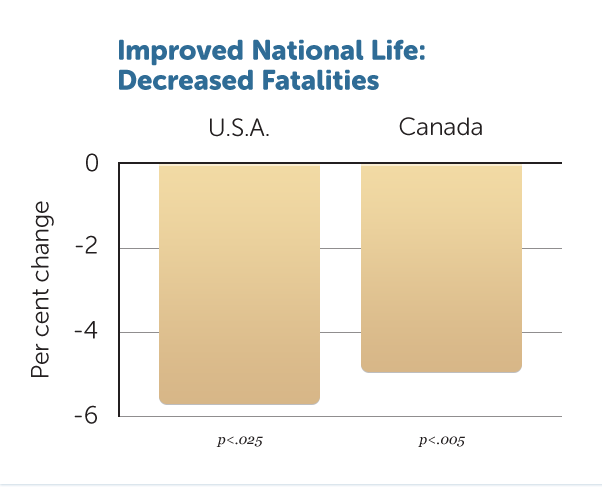 Weekly fatalities (homicides, suicides, and auto accidents) decreased significantly in the United States and in Canada during periods when the number of group participants in the TM Sidhi Programme exceeded the square root of one per cent of the national populations.Ref.Social Indicators Research 22: 399–418, 1990; Psychological Reports 76: 1171–1193, 1995
Weekly fatalities (homicides, suicides, and auto accidents) decreased significantly in the United States and in Canada during periods when the number of group participants in the TM Sidhi Programme exceeded the square root of one per cent of the national populations.Ref.Social Indicators Research 22: 399–418, 1990; Psychological Reports 76: 1171–1193, 1995
Social effects of Yogic Flying studied.
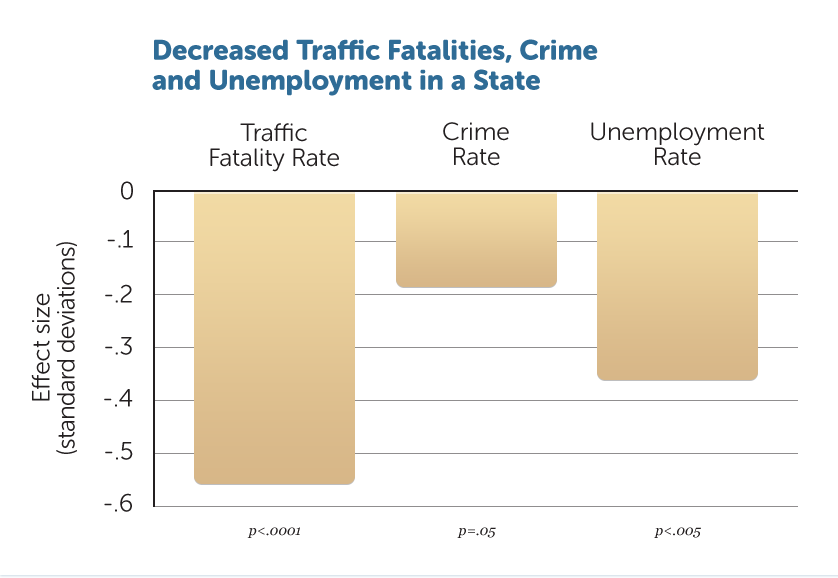 Time series transfer function analysis indicated that monthly rates of traffic fatalities, crime, and unemployment decreased significantly after a large group of participants in the TM Sidhi Programme was established at Maharishi International University (now Maharishi University of Management) in the state of Iowa, USA.Ref.Dissertation Abstracts International 51(12): 6155B, 1991
Time series transfer function analysis indicated that monthly rates of traffic fatalities, crime, and unemployment decreased significantly after a large group of participants in the TM Sidhi Programme was established at Maharishi International University (now Maharishi University of Management) in the state of Iowa, USA.Ref.Dissertation Abstracts International 51(12): 6155B, 1991
Social effects of Yogic Flying studied.
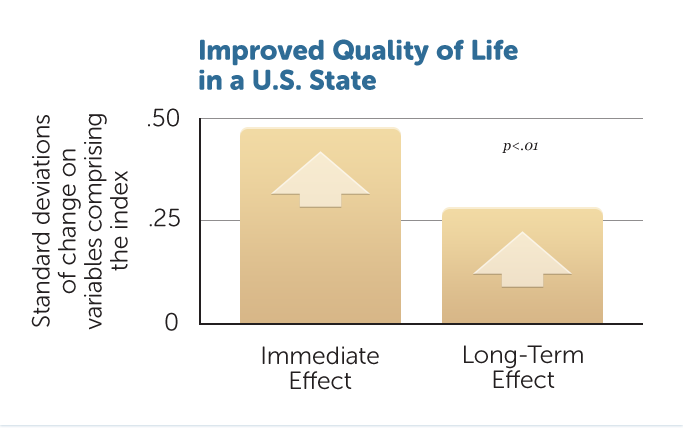 Quality of life improved in the State of Rhode Island, in comparison to a control state, during periods in which groups of participants in the TM Sidhi Programme were established. Quality of life was measured by improvement in a comprehensive index that includes crime, auto accidents, motor vehicle fatalities, deaths due to other causes, alcoholic beverage consumption, cigarette consumption, unemployment, and pollution.Ref.The Journal of Mind and Behavior 8: 67–104, 1987
Quality of life improved in the State of Rhode Island, in comparison to a control state, during periods in which groups of participants in the TM Sidhi Programme were established. Quality of life was measured by improvement in a comprehensive index that includes crime, auto accidents, motor vehicle fatalities, deaths due to other causes, alcoholic beverage consumption, cigarette consumption, unemployment, and pollution.Ref.The Journal of Mind and Behavior 8: 67–104, 1987
Social effects of Yogic Flying studied.
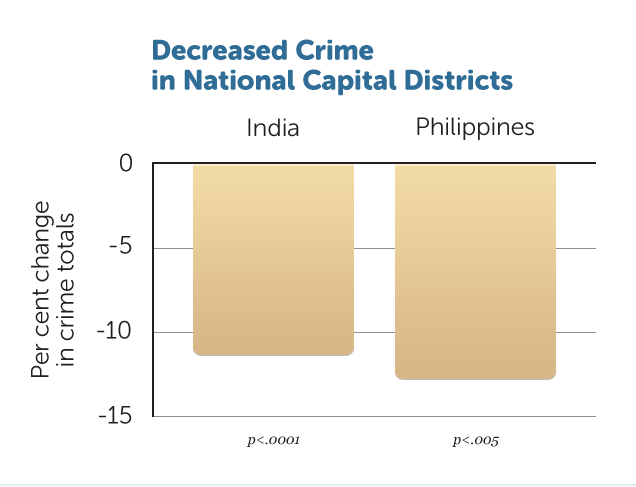 During periods in which large groups of participants in the TM Sidhi Programme were established, crime totals decreased significantly in the Union Territory of Delhi (India) and in Metro Manila (Philippines).Ref.The Journal of Mind and Behavior 8: 67–104, 1987
During periods in which large groups of participants in the TM Sidhi Programme were established, crime totals decreased significantly in the Union Territory of Delhi (India) and in Metro Manila (Philippines).Ref.The Journal of Mind and Behavior 8: 67–104, 1987
Social effects of Yogic Flying studied.
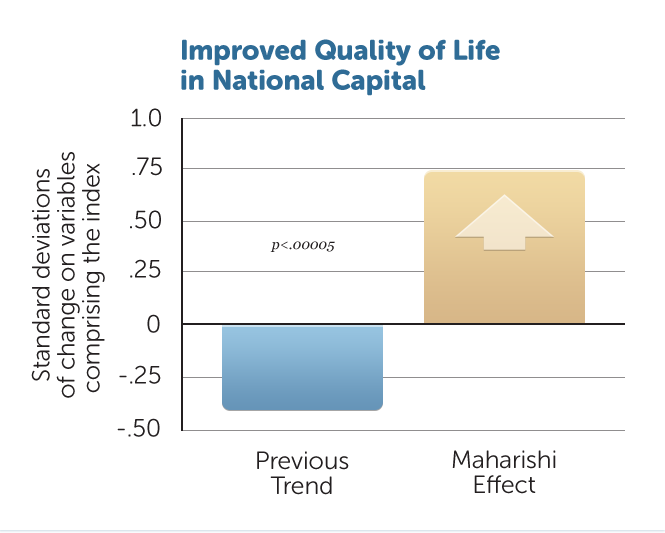 Improved quality of life, as measured by an index comprising reduced emergency psychiatric calls, reduced trauma, fewer complaints against police, and fewer accidental deaths, was found when a large group of participants in the TM Sidhi Programme was established.Ref.‘Transforming political institutions through individual and collective consciousness: The Maharishi Effect and government’. Paper presented at the annual meeting of the American Political Science Association, Washington, DC, August 1997
Improved quality of life, as measured by an index comprising reduced emergency psychiatric calls, reduced trauma, fewer complaints against police, and fewer accidental deaths, was found when a large group of participants in the TM Sidhi Programme was established.Ref.‘Transforming political institutions through individual and collective consciousness: The Maharishi Effect and government’. Paper presented at the annual meeting of the American Political Science Association, Washington, DC, August 1997
Social effects of Yogic Flying studied (kommer inom kort på svenska)
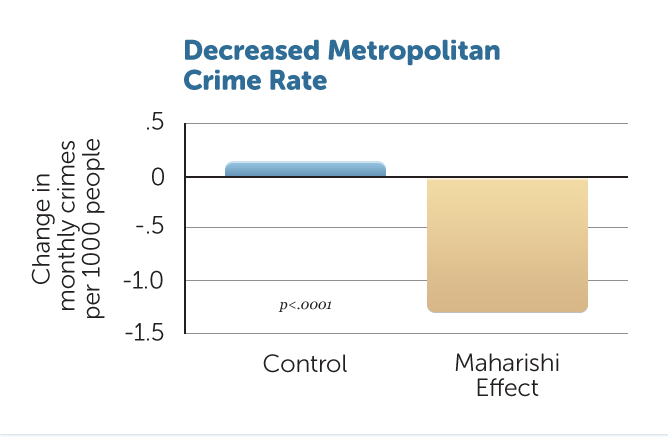 Metropolitan Merseyside, England showed decreased crime when the number of group participants in the TM Sidhi Programme in an adjacent community reached the square root of one per cent of the metropolitan area.Ref.Psychology, Crime, and Law 2: 165–174, 1996
Metropolitan Merseyside, England showed decreased crime when the number of group participants in the TM Sidhi Programme in an adjacent community reached the square root of one per cent of the metropolitan area.Ref.Psychology, Crime, and Law 2: 165–174, 1996
Social effects of Yogic Flying studied.
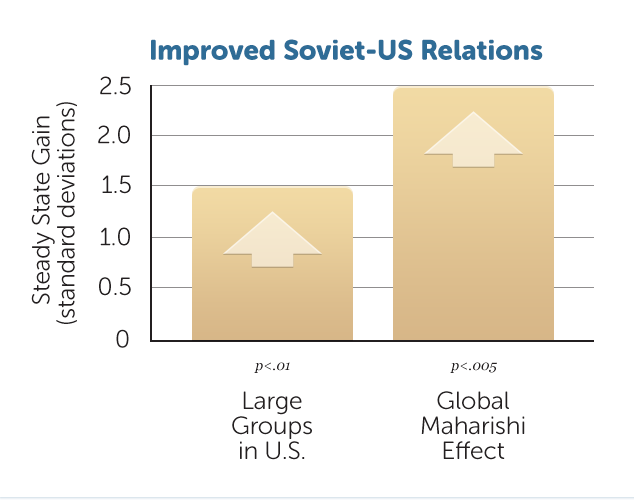 During periods from 1979 to 1986 the size of a group of participants in the TM Sidhi Programme in the United States was larger than 1700, creating the strongest influence of the Maharishi Effect in the United States. There was a significant increase of positivity of actions of the Soviet Union towards the United States, as shown by the left bar. The right bar indicates an even greater increase in positive actions of the Soviet Union towards the United States, during the specific periods of several assemblies in North America and in Europe that approached or exceeded the square root of one per cent of the world’s population, about 7,000 at the time. The study, using time series analysis of an independent data bank, the Zürich Project on East-West Relations, confirmed that this influence of increased positivity was independent of the actions of the US towards the Soviet Union and independent of changes in Soviet leadership. In addition, during periods when the size of the group in the United States was sufficient to create the Maharishi Effect in the US, the behaviour of the United States towards the Soviet Union also became more positive.Ref.Proceedings of the American Statistical Association, Social Statistics Section, pp. 297–302. Alexandria, VA: American Statistical Association, 1990. (2) ‘U.S.–Soviet relations and the Maharishi Effect: A time series analysis.’ Paper presented at the Annual Meeting of the American Statistical Association, Social Statistics Section, Atlanta, Georgia, August 1991
During periods from 1979 to 1986 the size of a group of participants in the TM Sidhi Programme in the United States was larger than 1700, creating the strongest influence of the Maharishi Effect in the United States. There was a significant increase of positivity of actions of the Soviet Union towards the United States, as shown by the left bar. The right bar indicates an even greater increase in positive actions of the Soviet Union towards the United States, during the specific periods of several assemblies in North America and in Europe that approached or exceeded the square root of one per cent of the world’s population, about 7,000 at the time. The study, using time series analysis of an independent data bank, the Zürich Project on East-West Relations, confirmed that this influence of increased positivity was independent of the actions of the US towards the Soviet Union and independent of changes in Soviet leadership. In addition, during periods when the size of the group in the United States was sufficient to create the Maharishi Effect in the US, the behaviour of the United States towards the Soviet Union also became more positive.Ref.Proceedings of the American Statistical Association, Social Statistics Section, pp. 297–302. Alexandria, VA: American Statistical Association, 1990. (2) ‘U.S.–Soviet relations and the Maharishi Effect: A time series analysis.’ Paper presented at the Annual Meeting of the American Statistical Association, Social Statistics Section, Atlanta, Georgia, August 1991
Vad framgångsrika TM-utövare säger (klicka på bilderna)
 Cameron Diaz
Cameron Diaz
 Hugh Jackman
Hugh Jackman
 Jim Carrey
Jim Carrey
 Lykke Li
Lykke Li
 Oprah Winfrey
Oprah Winfrey
 David Lynch
David Lynch
 Paul McCartney
Paul McCartney
 Clint Eastwood
Clint Eastwood
 Katy Perry
Katy Perry
 George Lucas
George Lucas
 Jerry Seinfeld
Jerry Seinfeld
 Moby
Moby
 Gwyneth Paltrow
Gwyneth Paltrow
 Martin Scorcese
Martin Scorcese
 Ellen Degeneres
Ellen Degeneres
 Dr. Oz
Dr. Oz
 År 2008 placerade Time Magazine Dr Oz som nummer 44 i listan över de 100 mest inflytelsefika människorna i världen. Han är chef för avdelningen för hjärtsjukdomar vid ett framstående sjukhus i New York, är författare till flera böcker och har för närvarande en egen tv-show som sänds över hela världen.
År 2008 placerade Time Magazine Dr Oz som nummer 44 i listan över de 100 mest inflytelsefika människorna i världen. Han är chef för avdelningen för hjärtsjukdomar vid ett framstående sjukhus i New York, är författare till flera böcker och har för närvarande en egen tv-show som sänds över hela världen.
Dr Oz har själv utövat TM sedan åtskilliga år tillbaka och han betalade själv kursavgiften för att 200 av de anställda på hans show skulle kunna lära sig tekniken. Han talar regelbundet om TM på offentliga tillställningar och förklarar hur TM har en positiv effekt på högt blodtryck, diabetes, kolesterol och hjärt- kärlsjukdomar som inte alltid går att uppnå med medicinering. Dr Oz: “TM kan ändra på saker som vi inte trodde gick att ändra på.”

“TM ger mig en edge. Tack vare att jag mediterar två gånger om dagen blir jag sällan stressad och känner mig alltid öppen för att se en utmaning ur flera perspektiv. Det har hjälpt mig att fatta beslut utifrån vad jag själv känner att jag behöver och inte utifrån yttre påfrestningar. TM håller mig i balans och gör så att jag alltid kan ge det där lilla extra.”
Gabriel Högberg - studerande





